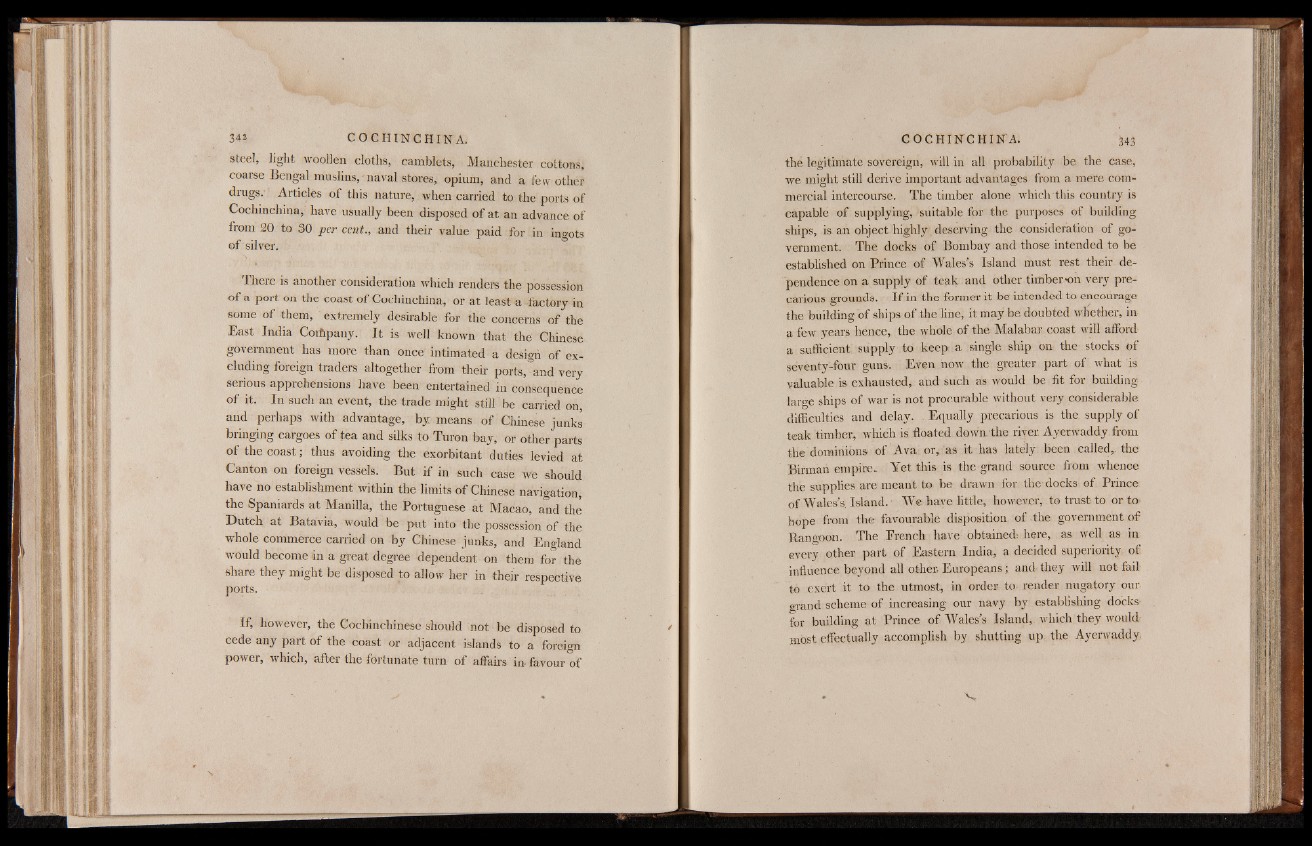
steel, light woollen cloths, camblets, Manchester cottons,
coarse Bengal muslins, naval stores, opium, and a few other
drugs. Articlès of this nature, when carried to the ports of
Cochinchina, have usually been disposed of at an advance of
from 20 to 30 per cent., and their value paid for in ingots
of silver.
There is another consideration which renders the possession
of a port on the coast of Cochinchina, or at least a factory in
some of them, extremely desirable for the concerns of the
East India Corftpany. I t is well known that the Chinese
government has more than once intimated a design of excluding
foreign traders altogether from their ports, and very
serious apprehensions have been entertained in consequence
of it. In such an event, the trade might still be carried on,
and perhaps with advantage, by means of Chinese junkè
bringing cargoes of tea and silks to Turon bay, or other parts
of the coast; thus avoiding the exorbitant duties levied at
Canton on foreign vessels. But if in such case we should
have no establishment within the limits of Chinese navigation,
the Spaniards at Manilla, the Portuguese at Macao, and thè
Dutch at Batavia, would be put into the possession of the
whole commerce carried on by Chinese junks, and England
would become in a great degree dependent on them for the
share they might be disposed to allow her in their respective
ports.
If, however, the Cochinchinese should not be disposed to
cede any part of the coast or adjacent islands to a foreign
power, which, after the fortunate turn of affairs in* favour of
thé legitimate sovereign, will in all probability be the case,
we might still derive important advantages from a mere commercial
intercourse. The timber alone which this country is
capable of supplying, suitable for the purposes of building
ships, is an object highly deserving the consideration of government.
The docks of Bombay and those intended to be
established on Prince of Wales's Island must rest their dependence
on a supply of teak and other timber *on very precarious
grounds. I f in the former it be intended to encourage
the building of ships of the line, it may be doubted whether, in
a few years hence, the whole of the Malabar coast will afford
a sufficient supply to keep a single ship on the stocks of
seventy-four guns. Even how the greater part of what is
valuable is exhausted, and such as would be fit for building
large ships of war is not procurable without very considerable
difficulties and delay. f Equally precarious is the supply of
teak timber., which is floated down the river. Ayerwaddy from
the dominions of A va or, as it has lately been called,, the
Birman empire. Yet this is the grand source from whence
the supplies are meant to be drawn for the docks, of Prince
of Wales’s. Island. We have little, however, to trust-to or to
hope from the favourable disposition of -the government of
Rangoon. The Erench have obtained; here, as well as in
every other part of Eastern India, a decided superiority of
influence beyond all other, Europeans ; and- they will not fail
to exert it to the utmost, in order to render nugatory our
grand scheme of increasing our navy by establishing docks-
for building at Prince of Wales’s Island, which they would
most effectually accomplish by shutting u p : the Ayerwaddy
%